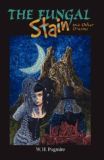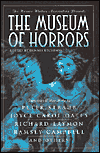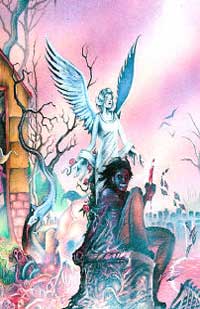
The Fungal Stain and Other Dreams, by W. H. Pugmire, Robert H. Knox
Book Review by John Goodrich
Have you read this book?
I think it took me two good examinations of the cover to realize that the subtitle is "and Other Dreams". Nothing could be more appropriate for this delightful collection of Wilum's work. No other writer synthesizes the two aspects of Lovecraft's writings-his horror and his dream sequences, as interestingly and as thoroughly as Wilum Pugmire does. Which is not to say that this is a book of stories that are familiar to someone who has read Lovecraftian. They are not. These stories, although they owe a great debt to Lovecraft, are not imitations of his plots or tropes. Each of these stories is uniquely and originally Pugmirian.
Wilum has imagination to spare, and he brings it to bear with the a sharp intensity that makes his stories, whether a short piece of flash fiction like "His Splintered Kiss," or a longer piece such as "An Eidolon of Nothing," come alive. His imagery is lush and alive, neither smothering nor too light-just the right amount to establish the (usually decadent) atmosphere of the story.
The Fungal Stain-only two hundred pages or so-is remarkable in the time it takes to read and digest. Pugmire's prose doesn't slide away from the reader, allowing the pages slip by unnoticed. Something is always going on below the surface, like sharks under calm water, and this reader wanted to make sure he didn't miss any of it. His prose has a profundity and a complexity that is a welcome change from many of the facile, shallow books I have been reading.
Wilum is at his best in the Sesqua Valley. He is clearly comfortable there, and has a well-established dreaming, brooding atmosphere that soaks into his words. The difficulty in reviewing these stories is that they are so unique that the reviewer is tempted to summarize and explain them, a task that is nearly impossible. The collection begins with "An Eidolon of Nothing," which therefore introduces the reader not only to the Sesqua Valley, but also some of Pugmire's recurring characters, "Hour of their Appetite" is a dream sequence, strange and misty in its logic, and yet there is a curious sense of closure when the story is done. Of all of Pugmire's stories, this dream-logic story fascinates me the most. I do not dream as much as many writers seem to, and the ability to create a narrative, especially when it is not what one ordinarily thinks of as a story, out of the shattered fragments of sensation and vision that fill our minds as we sleep is something remarkable to me.
Long or short, there is always a poignance to Pugmire's work. "Jigsaw Boy" draws a brilliant, bitter portrait of an unnamed narrator who is in the last stages of metaphorically devouring himself, distanced from his humanity, sadly searching for the missing pieces of his life. "Blam of Nepthene" is as gently nihilistic a story as can be imagined, about a yearning for the peace of the grave. Unlike so many post-Poe stories with the same theme, Pugmire's story has some sense of aching weariness to it, rather than boredom. "Stupor Mundi" is an ekphrastic piece, writing about art, which has occasionally been compared to dancing about architecture. Yet Pugmire seems familiar enough, or able to fake it extremely well, that the reader can visualize the art described in the story.
Strangely, it is the last story, "Your Metamorphic Moan" that explores the Sesqua Valley to the fullest. Perhaps because several of the previous stories have been set in the Valley, it seems most familiar and realized in the "Metamorphic Moan." What I enjoy about Pugmire's plotting is the lack of conventional morality which dictates the ending of so many horror stories, rendering them predictable. In other hands, the story of a goth girl who finds a kindred spirituality with the Sesqua Vallery might come out to a happy ending in which she tries hard and earns herself place among the strange folk of the Valley. Pugmire is not so... predictable.
Some authors acknowledge their debt to Lovecraft with a simple "Cthulhu" or a "Yog-Sothoth" and merrily ignore Lovecraft's major themes. Wilum Pugmire, shows a deeper, more studied appreciation of Lovecraft, incorporating certain of his literary idol's themes and mixing them in with his own writer's voice. It's a combination that works; these stories are truly unique. Pugmire's prose rewards careful reading, and his stories stayed with this reader. Although he states that he wishes to always remain in Lovecraft's titanic literary shadow, Wilum Pugmire is clearly original and skilled enough that he casts his own.
Wilum has imagination to spare, and he brings it to bear with the a sharp intensity that makes his stories, whether a short piece of flash fiction like "His Splintered Kiss," or a longer piece such as "An Eidolon of Nothing," come alive. His imagery is lush and alive, neither smothering nor too light-just the right amount to establish the (usually decadent) atmosphere of the story.
The Fungal Stain-only two hundred pages or so-is remarkable in the time it takes to read and digest. Pugmire's prose doesn't slide away from the reader, allowing the pages slip by unnoticed. Something is always going on below the surface, like sharks under calm water, and this reader wanted to make sure he didn't miss any of it. His prose has a profundity and a complexity that is a welcome change from many of the facile, shallow books I have been reading.
Wilum is at his best in the Sesqua Valley. He is clearly comfortable there, and has a well-established dreaming, brooding atmosphere that soaks into his words. The difficulty in reviewing these stories is that they are so unique that the reviewer is tempted to summarize and explain them, a task that is nearly impossible. The collection begins with "An Eidolon of Nothing," which therefore introduces the reader not only to the Sesqua Valley, but also some of Pugmire's recurring characters, "Hour of their Appetite" is a dream sequence, strange and misty in its logic, and yet there is a curious sense of closure when the story is done. Of all of Pugmire's stories, this dream-logic story fascinates me the most. I do not dream as much as many writers seem to, and the ability to create a narrative, especially when it is not what one ordinarily thinks of as a story, out of the shattered fragments of sensation and vision that fill our minds as we sleep is something remarkable to me.
Long or short, there is always a poignance to Pugmire's work. "Jigsaw Boy" draws a brilliant, bitter portrait of an unnamed narrator who is in the last stages of metaphorically devouring himself, distanced from his humanity, sadly searching for the missing pieces of his life. "Blam of Nepthene" is as gently nihilistic a story as can be imagined, about a yearning for the peace of the grave. Unlike so many post-Poe stories with the same theme, Pugmire's story has some sense of aching weariness to it, rather than boredom. "Stupor Mundi" is an ekphrastic piece, writing about art, which has occasionally been compared to dancing about architecture. Yet Pugmire seems familiar enough, or able to fake it extremely well, that the reader can visualize the art described in the story.
Strangely, it is the last story, "Your Metamorphic Moan" that explores the Sesqua Valley to the fullest. Perhaps because several of the previous stories have been set in the Valley, it seems most familiar and realized in the "Metamorphic Moan." What I enjoy about Pugmire's plotting is the lack of conventional morality which dictates the ending of so many horror stories, rendering them predictable. In other hands, the story of a goth girl who finds a kindred spirituality with the Sesqua Vallery might come out to a happy ending in which she tries hard and earns herself place among the strange folk of the Valley. Pugmire is not so... predictable.
Some authors acknowledge their debt to Lovecraft with a simple "Cthulhu" or a "Yog-Sothoth" and merrily ignore Lovecraft's major themes. Wilum Pugmire, shows a deeper, more studied appreciation of Lovecraft, incorporating certain of his literary idol's themes and mixing them in with his own writer's voice. It's a combination that works; these stories are truly unique. Pugmire's prose rewards careful reading, and his stories stayed with this reader. Although he states that he wishes to always remain in Lovecraft's titanic literary shadow, Wilum Pugmire is clearly original and skilled enough that he casts his own.
|
Click here to buy The Fungal Stain and Other Dreams, by W. H. Pugmire, Robert H. Knox on Amazon
|
The Fungal Stain and Other Dreams, by W. H. Pugmire, Robert H. Knox on Amazon

| More Books You Might Like |
Comment on The Fungal Stain and Other Dreams, by W. H. Pugmire, Robert H. Knox




